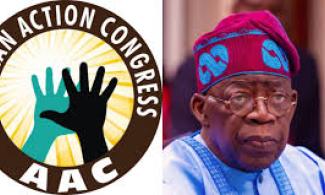
The African Action Congress (AAC) has said President Bola Tinubu’s actions in the newly signed resolution on OPL 245 licence show that his government is clueless about how to use the petroleum sector to improve the country’s struggling economy.
This was stated in a press statement issued by the AAC party chairman in Oyo State, Kayode Babayomi, on Wednesday.
Babayomi accused the current government of following in the footsteps of its predecessor to limit the country’s potential for growth.
The statement also berated President Tinubu for returning the OPL 245 licence to European oil giants Shell and Eni after a deal was reached earlier in November 2023 for AGIP to transfer some of its onshore assets, which analysts have clarified were massively undervalued at N500 million, to Wale Tinubu's Ocean and Oil PLC.
The statement continued: “Two fundamental points should be particularly highlighted for the sake of those who may not be alert. The first is that Mr Tinubu decided to return the licence to explore one of the country's richest oil fields to a private multinational without properly informing the Nigerian people in a manner that is transparent.
“Recall that the issue of OPL 245 dates back to 1998 and subsequent years of legal battles where Nigeria for years laid claims to over $1.1 billion in civil suits that allege corruption on the part of several participants in the deal.
“In the first instance, the details of Oando's deal with AGIP were conducted surreptitiously in what they called "price sensitive" before The Gazette told us per American investment banker, Jefferies Group, that it was around $500 million. Months after, it would require the pre-empting of the Gazette, for the government to disclose that it had decided to hand over a prized national asset of global reckon to private explorers.
“According to the junior minister of petroleum, Heineken Lokpobiri, this oil field is set to make a long-term addition to Nigeria's economy of up to $15 billion.
“Despite the public profile of this matter, from the streets of Abuja and Lagos where activists marched to the courts in Nigeria, the United Kingdom, Delaware, and Milan, Mr Tinubu chose to give members of his cabinet the approval to resolve all pending issues without an update for the Nigerian people, a mention at the National Executive Council or even an address to the stakeholders who have long sought justice in the matter.
“Mr Lokpobiri would go on to nonchalantly dismiss the clandestine schemings of the deal as a directive of the president, conveniently after The Gazette exposed the details. This falls short of any momentum his administration has gained in transparency in recent weeks.
“Aside from the fact that the Tinubu administration is shaping up to have nothing of substance to offer Nigerians in terms of transparency and accountability, the second most fundamental takeaway from this incident is that Mr Tinubu, like his predecessor, Muhamadu Buhari is clueless about the Nigerian petroleum sector, how to make it work for the Nigerian people and how it can power the massive economic and industrial boost that Nigeria needs.
“The most profound statement that this administration has made regarding the petroleum sector after unthoughtfully removing the subsidy programme last year is that the federal government will continue to provide the needed interventions in the industry.
“But this falls short of the multilayered need of the sector in repositioning it for the needed productivity. This according to the African Action Congress programme includes eradicating corruption and limiting foreign influence.”
According to the AAC, a transformative government, led by principled activists, is needed to uproot corruption in Nigeria's oil and gas sector.
The party said this would lead to the establishment of strict anti-corruption laws, investigation and prosecution of those involved in crude oil theft, and engagement of local communities and civil society groups to end the era.
The statement further reads: “The disproportionate sway of international oil companies (IOCs) over our oil and gas sector cannot be overstated. This undue influence is fuelled by the corrupt enrichment of government officials, as evidenced by various WikiLeaks revelations.
“Joint Venture Contracts with IOCs lack transparency, allowing these entities to exploit their technological expertise to garner benefits far exceeding their officially sanctioned 40% stake in Joint Venture Companies (JVCs). Furthermore, compliance with Nigerian content development regulations is often disregarded.
“Our administration will staunchly oppose unwarranted foreign control of our vital oil and gas sector. Notably, major global oil companies like Saudi Aramco and Brazilian Petrobras are either state-owned or publicly traded corporations.
“We advocate for the nationalisation of the oil and gas sector as a strategic pillar of the Nigerian economy. Any international oil company seeking to engage with us must adhere to terms that prioritise the interests of Nigerian workers under the progressive governance of the AAC.”